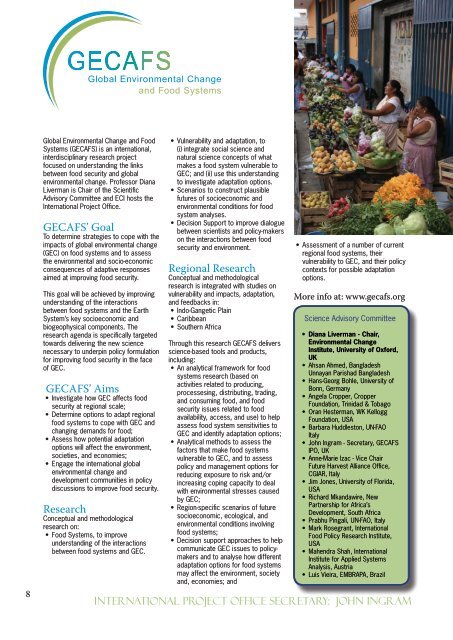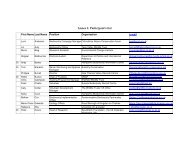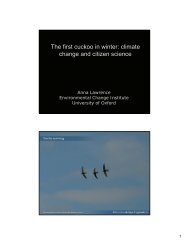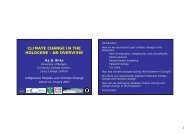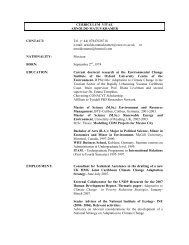ECI Annual Review 2006/2007 - Environmental Change Institute ...
ECI Annual Review 2006/2007 - Environmental Change Institute ...
ECI Annual Review 2006/2007 - Environmental Change Institute ...
You also want an ePaper? Increase the reach of your titles
YUMPU automatically turns print PDFs into web optimized ePapers that Google loves.
Global <strong>Environmental</strong> <strong>Change</strong> and Food<br />
Systems (GECAFS) is an international,<br />
interdisciplinary research project<br />
focused on understanding the links<br />
between food security and global<br />
environmental change. Professor Diana<br />
Liverman is Chair of the Scientific<br />
Advisory Committee and <strong>ECI</strong> hosts the<br />
International Project Office.<br />
GECAFS’ Goal<br />
To determine strategies to cope with the<br />
impacts of global environmental change<br />
(GEC) on food systems and to assess<br />
the environmental and socio-economic<br />
consequences of adaptive responses<br />
aimed at improving food security.<br />
This goal will be achieved by improving<br />
understanding of the interactions<br />
between food systems and the Earth<br />
System’s key socioeconomic and<br />
biogeophysical components. The<br />
research agenda is specifically targeted<br />
towards delivering the new science<br />
necessary to underpin policy formulation<br />
for improving food security in the face<br />
of GEC.<br />
GECAFS’ Aims<br />
•<br />
•<br />
•<br />
•<br />
Investigate how GEC affects food<br />
security at regional scale;<br />
Determine options to adapt regional<br />
food systems to cope with GEC and<br />
changing demands for food;<br />
Assess how potential adaptation<br />
options will affect the environment,<br />
societies, and economies;<br />
Engage the international global<br />
environmental change and<br />
development communities in policy<br />
discussions to improve food security.<br />
Research<br />
Conceptual and methodological<br />
research on:<br />
• Food Systems, to improve<br />
understanding of the interactions<br />
between food systems and GEC.<br />
•<br />
•<br />
•<br />
Vulnerability and adaptation, to<br />
(i) integrate social science and<br />
natural science concepts of what<br />
makes a food system vulnerable to<br />
GEC; and (ii) use this understanding<br />
to investigate adaptation options.<br />
Scenarios to construct plausible<br />
futures of socioeconomic and<br />
environmental conditions for food<br />
system analyses.<br />
Decision Support to improve dialogue<br />
between scientists and policy-makers<br />
on the interactions between food<br />
security and environment.<br />
Regional Research<br />
Conceptual and methodological<br />
research is integrated with studies on<br />
vulnerability and impacts, adaptation,<br />
and feedbacks in:<br />
•<br />
•<br />
•<br />
Indo-Gangetic Plain<br />
Caribbean<br />
Southern Africa<br />
Through this research GECAFS delivers<br />
science-based tools and products,<br />
including:<br />
• An analytical framework for food<br />
systems research (based on<br />
activities related to producing,<br />
processesing, distributing, trading,<br />
and consuming food, and food<br />
security issues related to food<br />
availability, access, and use) to help<br />
assess food system sensitivities to<br />
GEC and identify adaptation options;<br />
• Analytical methods to assess the<br />
factors that make food systems<br />
vulnerable to GEC, and to assess<br />
policy and management options for<br />
reducing exposure to risk and/or<br />
increasing coping capacity to deal<br />
with environmental stresses caused<br />
by GEC;<br />
• Region-specific scenarios of future<br />
socioeconomic, ecological, and<br />
environmental conditions involving<br />
food systems;<br />
• Decision support approaches to help<br />
communicate GEC issues to policymakers<br />
and to analyse how different<br />
adaptation options for food systems<br />
may affect the environment, society<br />
and, economies; and<br />
Science Advisory Committee<br />
Diana Liverman - Chair,<br />
<strong>Environmental</strong> <strong>Change</strong><br />
<strong>Institute</strong>, University of Oxford,<br />
UK<br />
Ahsan Ahmed, Bangladesh<br />
Unnayan Parishad Bangladesh<br />
Hans-Georg Bohle, University of<br />
Bonn, Germany<br />
Angela Cropper, Cropper<br />
Foundation, Trinidad & Tobago<br />
Oran Hesterman, WK Kellogg<br />
Foundation, USA<br />
Barbara Huddleston, UN-FAO<br />
Italy<br />
John Ingram - Secretary, GECAFS<br />
IPO, UK<br />
Anne-Marie Izac - Vice Chair<br />
Future Harvest Alliance Office,<br />
CGIAR, Italy<br />
Jim Jones, University of Florida,<br />
USA<br />
Richard Mkandawire, New<br />
Partnership for Africa’s<br />
Development, South Africa<br />
Prabhu Pingali, UN-FAO, Italy<br />
Mark Rosegrant, International<br />
Food Policy Research <strong>Institute</strong>,<br />
USA<br />
Mahendra Shah, International<br />
<strong>Institute</strong> for Applied Systems<br />
Analysis, Austria<br />
Luis Vieira, EMBRAPA, Brazil<br />
International Project Office Secretary: John Ingram<br />
•<br />
Assessment of a number of current<br />
regional food systems, their<br />
vulnerability to GEC, and their policy<br />
contexts for possible adaptation<br />
options.<br />
More info at: www.gecafs.org<br />
•<br />
•<br />
•<br />
•<br />
•<br />
•<br />
•<br />
•<br />
•<br />
•<br />
•<br />
•<br />
•<br />
•


